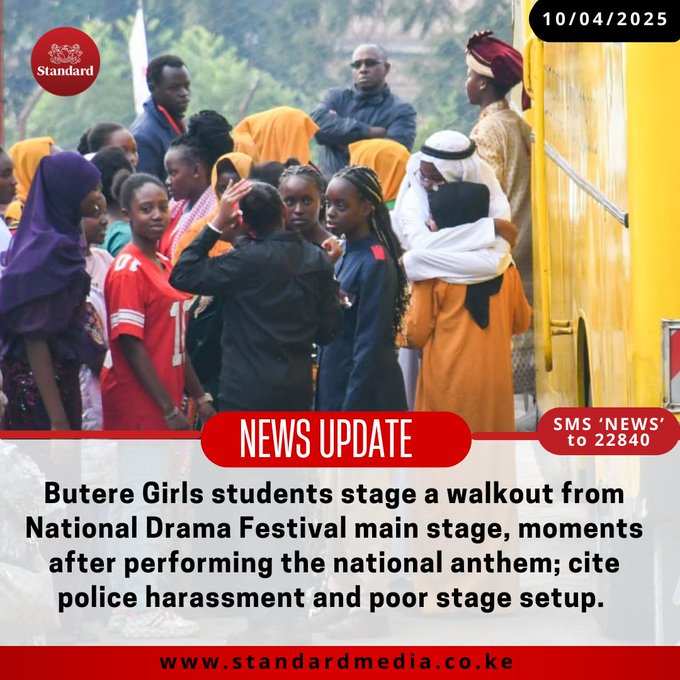NAIROBI, Kenya – What was meant to be a spotlight moment for Butere Girls High School turned into a national spectacle of censorship, emotion, and unanswered questions.
The students’ powerful play, Echoes of War—a production echoing themes of governance and the 2024 Gen Z protests—never got its chance on stage during Thursday’s Kenya National Drama Festivals in Nakuru.
Instead of applause, the girls were met with silence. Not because they lacked talent, but because they lacked everything else.
A Performance That Never Was
At around 8 a.m. on Thursday, Butere Girls stepped onto the stage at Kirobon Girls High School—not to perform, but to protest.
Denied a functional public address system, which is standard equipment for performances at the festival, the students stood in defiance.
With tears streaming down their faces, they sang the National Anthem before exiting the stage in silence.
The symbolic act was a heartbreaking response to what they described as deliberate sabotage.
Their voices weren’t the only ones stifled. The girls reportedly hadn’t seen the play’s directors in weeks and hadn’t trained for three—raising eyebrows about behind-the-scenes interference.
What’s worse, the auditorium was allegedly cleared of its audience. No crowd. No claps. Just empty chairs and suppressed voices.
‘Echoes of War’ stand-off: Butere Girls boycott performance, want Malala present ntvkenya.co.ke/news/echoes-of…
The Controversy Behind Echoes of War
This isn’t the first time Echoes of War has sparked tension. The play had already been disqualified under murky circumstances during the Western Region Drama Festivals.
But a subsequent High Court ruling overruled the decision, instructing the Ministry of Education to include the piece in the national program.
Yet, controversy continued to trail the production. On Wednesday, Cleophas Malala—the play’s scriptwriter and a former Senator—was blocked from entering the venue. By 5 p.m., he claimed his vehicle had been barricaded by police, with threats of arrest looming.
Later that night, matters escalated. Police reportedly lobbed teargas canisters at journalists camped outside Kirobon Girls.
Butere Girls students stage a walkout from National Drama Festival main stage, moments after performing the national anthem; cite police harassment and poor stage setup.
Cameras Off, Curtains Drawn
In a move that has prompted allegations of state censorship, journalists and the public were denied entry into the venue on Thursday.
The Kenya Institute of Curriculum Development (KICD), which usually livestreams the event, was ordered to pack up. Even media partners were barred from filming.
“No audience, no video, no photography, no shooting,” one coverage team member told Citizen Digital. “Even KICD won’t stream local productions.”
As the cameras were shut off and the curtains drawn—not by script, but by suppression—the message was loud and clear: Some stories, it seems, are just too powerful to tell.
Whether it’s about the message of Echoes of War or the growing unease around student expression, what happened in Nakuru is more than just school drama. It’s a chilling reminder of how art, when it speaks truth, can rattle power.
And when students are left singing their anthem through tears, the real tragedy isn’t that a play went unperformed—it’s that a generation’s voice was hushed.




